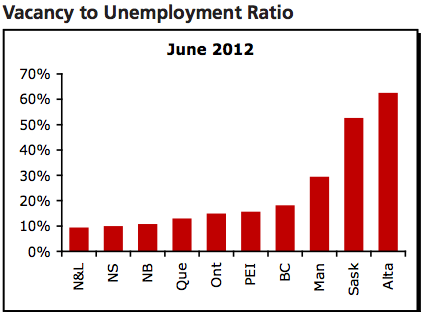“Where the Jobs Are” in Canada
Public discussion has been growing over a report recently published by the Canadian Imperial Bank of Commerce (CIBC). The report indicates a growing divide between the number of high-vacancy job fields in Canada and the skills of the Canadian workforce. To combat labour shortages, Canadian employers and government officials are increasingly looking beyond their own borders to find the employees they need. In addition, the government is taking ambitious efforts to secure skilled foreign workers, on temporary or permanent bases, to close employment gaps across the country.
In its report, CIBC targeted 25 professions that are most in need of qualified employees. They are as follows:
- Managers in Engineering, Architecture, Science and Info Systems
- Managers in Health, Education, Social and Community Services
- Managers in Construction and Transportation
- Auditors, Accountants and Investment Professionals
- Human Resources and Business Service Professionals
- Professional Occupations in Natural and Applied Science
- Physical Science Professionals
- Life Science Professionals
- Civil, Mechanical, Electrical and Chemical Engineers
- Other Engineers
- Professional Occupations in Health
- Physicians, Dentists and Veterinarians
- Optometrists, Chiropractors and Other Health Diagnosing and Treating Professionals
- Pharmacists, Dietitians and Nutritionists
- Therapy and Assessment Professionals
- Nurse Supervisors and Registered Nurses
- Technical and Related Occupations in Health
- Medical Technologists and Technicians (Except Dental Health)
- Technical Occupations in Dental Health Care
- Other Technical Occupations in Health Care (Except Dental)
- Psychologists, Social Workers, Counsellors, Clergy and Probation Officers
- Supervisors, Mining, Oil and Gas
- Underground Miners, Oil and Gas Drillers and Related Workers
- Supervisors in Manufacturing
- Supervisors, Processing Occupations
These occupations are all considered skilled work by the Government of Canada. In general, these professions fall in the fields of healthcare, mining, and manufacturing or business services. When added together, these fields account for 21%, or about one-fifth, of jobs in Canada.
Canada’s need for qualified workers varies greatly from province to province. As demonstrated by the chart below, the need is most defined in the country’s rapidly-developing interior. It is reflective of Canada’s booming natural resources economy.
Source: CIBC
Canadian employment is still on the rise. In fact, employment grew by 51,000 in February 2013 alone. However, despite these increases, the country is unable to fill shortages in the fields listed above with home-grown talent alone. Analysts have theorized that this lack of qualified Canadians is the result, in part, of individuals pursuing education and training in professions that are experiencing a labour surplus. These include occupations in the fields of clerical work, food services, recreational guides, personal services and sales. Due to this surplus, individuals in these fields may see greater unemployment as well as wages slightly below average.
By contrast, those who pursue employment in one of the above targeted professions have a high likelihood of employment. At present, unemployment in this pool is a mere 1%. Additionally, wages in these fields have been rising steadily at a rate of about 4% per year.
The Canadian government has made efforts to offset employee shortages through a forward-thinking immigration system. Individuals with the education and skills most needed in Canada will find that programs for both temporary and permanent residence have been tailored to suit their profiles. Some recent immigration changes intended to bring in the workers Canada include:
- The popular Federal Skilled Worker Program has overhauled its selection criteria to better target those individuals who have a high likelihood of succeeding upon arrival in Canada. Citizenship and Immigration Canada hopes to accept over 50,000 new permanent residents through this program alone in 2013.
- A new class of immigration, the Federal Skilled Trades Class, has been created to more efficiently bring tradespersons to Canada.
- Discussions are currently in place regarding the introduction of a new immigration system, known as an Expression of Interest system, that will directly connect Canadian employers and government officials with skilled workers interested in immigrating to Canada.
More than ever, Canada needs immigrants to fill the jobs that Canadians are unable to perform. These jobs are for the most part in well-paying fields with high wages and employment. Individuals with skills in these fields may find themselves well-placed to take advantage of Canada’s many options for temporary or permanent residency.
You can search for jobs in Canada with the Canadavisa Job Search Tool.
To find out if you are qualified for one of over 60 Canadian immigration programs, please fill out a free online assessment.
- Do you need Canadian immigration assistance? Contact the Contact Cohen Immigration Law firm by completing our form
- Send us your feedback or your non-legal assistance questions by emailing us at media@canadavisa.com




